Student Blog
Life Hacks
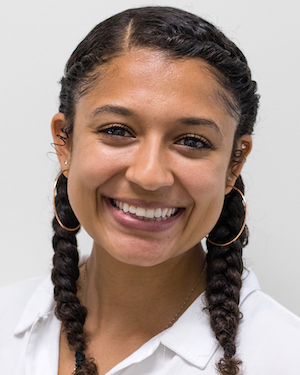
Cheers to Trusting the Process till the End! ⟩
May 5, 2020, by Kat
Life Hacks
Exactly two years ago, I was notified I was accepted into the entry level masters program here at USC. It was not your typical acceptance though. I was waitlisted. I did not get to attend the Accepted Student Reception. I did not have much time before I had to give my two weeks notice for my full time job. During my time on the waitlist, I was stressed. Every morning I would wake up hoping to receive an email with good news. After I had received the email stating I was on the waitlist in February, I tried to stay positive. The Admissions team notified me that they do indeed use the waitlist and admit students. This gave me some hope, but as February, March, and April ended I was becoming pessimistic. But I told myself, “if it is meant for me, it will be.” I just had to trust the process.
As you can see . . . I was accepted!! Now came the next hurdle. I can relate to Kaho’s Blog Post about not feeling like I belonged in the program when I first started. I was battling between having just left a full time job, taking out loans to attend school, and finding it a bit difficult to find my own community within the program. I was not sure if I had made a mistake in coming to USC. I was starting to question how I would make it through my masters and finish it. I had to rely on my hard work and resilience. I just had to trust the process.
After opening myself up to my peers, seeking guidance from professors, and making myself known (see my previous post), I started to feel more at home. So much so that school became my second home. Acquaintances became classmates. Classmates became friends. And my friends are now my family. I could not have made it through my masters program without the support I received both in and outside of the classroom from my school friends and family. They have helped keep me accountable, flexible, and focused. They encouraged me, validated me, and reminded me why I started this journey. This is how I was able to make it through the #1 OT program in the nation! 50% hard work, 50% support. I doubted my ability to be successful at USC. But I found my community to help me make it through. I just had to trust the process.
This past semester was not the last semester of graduate school that I was anticipating. Some of my Externship opportunities were cancelled and others became remote. The last 6 weeks of class were online. And second year students recently found out that our second level 2 fieldwork will also be remote. Although this is disappointing and I am still in the process of grieving this loss of an in person fieldwork opportunity, I am once again trying to stay positive. These things have been out of everyone’s control. But the professors, staff, and fieldwork team have all been so supportive during this difficult time for students. I am not sure what this summer will bring. I will just have to continue trusting the process.
Class of 2020, we have come too far to give up. We are so close to the finish line. We need to continue relying on each other for encouragement. We need to keep pushing each other to be the best we can be. And most of all, we need to trust the process. Our hard work has brought us this far and it will continue to open doors for us.
Congratulations class of 2020! It was a pleasure being a student ambassador.
Fight On!!
⋯
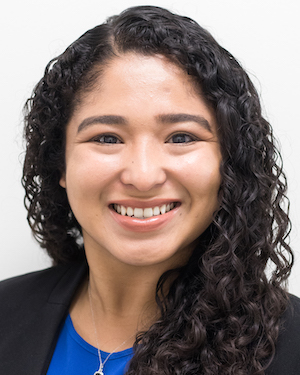
Dear Class of 2020 ⟩
April 29, 2020, by Marilyn
Life Hacks Videos
To all of the graduates of Class of 2020 or anyone who was about to be celebrated, but due to the pandemic things have changed — this is for you! I know at a certain point we had to grieve the change of an expectation due to things not going as planned (graduation, fieldwork, last day of class celebration with peers, etc.). However, I genuinely believe these changes are outside of our control, so we learned how to become flexible and developed the faith to trust the process. We have discovered the greatness of leaning on our village of family, peers, mentors, staff, and faculty now more than ever for support. And they have risen to the occasion!
As we move on to a different phase of life academically or professionally there will be moments that our highest accomplishments will not be celebrated or may go unnoticed, but that does not mean you didn’t accomplish it! If you ever forget how great you are, please remember how you were able to navigate this experience and you will remind yourself that you are prepared! If you are a prospective student or a student in the program I hope this video can show you how student life was like before COVID-19.
We will see each other soon!
FIGHT ON.
⋯
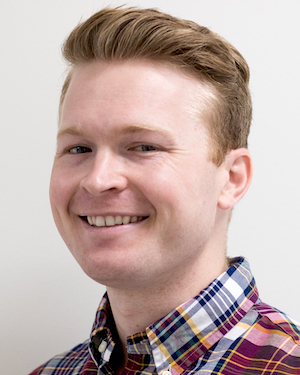
Advice for Incoming Master’s Students ⟩
April 28, 2020, by Kevin
Getting Involved Life Hacks
Congratulations, you are officially a Trojan or Double Trojan! You have just made one of the best decisions of your life to pursue a master’s degree in occupational therapy from the USC Chan Division! I have no regrets making that same decision two years ago and I cannot wait to continue with USC in the OTD program. This is my last blog as a student ambassador, and I wanted to end this time by passing on some of the lessons I learned during my time in the master’s program. Here are my top three pieces of advice:
Make Time for Fun, Friends, and Family
While the master’s program is not simple walk in the park, it should not feel like a walk through the haunted woods. You are a dedicated student and you deserve to take a breath and relax from time-to-time. Make it a priority to have at least one small, fun or social activity to look forward to each day. Once I start incorporating leisure and family time into my daily schedule, I found myself with little stress and my attention to coursework improved.
Reach Out to USC Faculty, Staff, and Students
The Trojan Family is not just a saying! The faculty, staff, and students at USC will be there for you whenever you need them, all you need to do is reach out. Even if it is not related to the program, there is always someone willing to provide you help or guidance for anything you may need. Specifically, the faculty and staff in the Chan Division have been incredibly supportive and approachable throughout my master’s program. Even now during this time at home, USC faculty members are willing to meet with students individually to discuss their goals and wellbeing. Just as I recommend reaching out to your friends and family, do not forget to make time for your Trojan Family!
Say Yes and Take Advantage of Opportunities in the Master’s Program
The Chan Division will introduce you to many new and exciting opportunities in the field of occupational therapy and beyond. From guest lectures, to innovation bootcamps, to volunteer events, find what interest you and utilize the opportunities the Chan Division has to offer. Additionally, when an opportunity comes along that you were not expecting, adventure out and say “yes”! You may discover a new practice field, a new interest, or a new friend.
These are my top three pieces of advice coming into this program. While studying is also important, I feel it was these three things that made my experience in the master’s program as amazing as it was. After building my foundation of support and taking new opportunities, I found that the studying came easy and my coursework had more meaning. Congratulations again on embarking on what will likely be one of the most transformative and positive experiences of your life! Fight on!
⋯
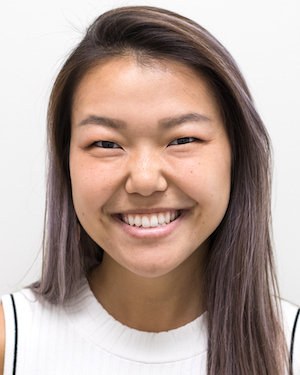
What I Wish I Knew When I Started the Program ⟩
April 28, 2020, by Kaho
First-Gen Life Hacks
– I belong.
Immediately after starting the OT program at USC, I was astounded by my classmates and future colleagues’ fiery passion for occupational therapy. I was inspired, motivated, excited, and grateful to be learning with them and growing alongside them. However, at some point along the way, it began to make me question my own passion. Perhaps it was because I was going through the adult rehabilitation immersion – the most rigorous immersion in my opinion – in my first semester of grad school and I was losing confidence in my capabilities. On top of that, anyone that has sat through lecture with me would know that I am not one to raise my hand and share my thoughts in front of the whole class. I don’t have a problem with public speaking or small group discussions, but I am reserved when it comes to my opinions and prefer to learn just by listening. I have found that I focus and absorb the material better this way anyway. While American culture often values traits of extroverts, I grew up in a culture that values the opposite. This quiet characteristic of mine made me feel like I was somehow inferior to my more vocal classmates. I wondered if I preferred not to speak up because I didn’t care enough about the topic, because I lacked passion.
Additionally, I couldn’t help but feel like an outsider when I entered the program because I faced financial hardships, as well as a complicated and difficult past. Committing to USC was a tough decision, but I still chose this program because it was my top choice, it was highly ranked (#1 in the US woohoo), and I believed it was worth the additional loans. As a financially independent first-generation immigrant and first-generation graduate student, I had difficulty finding community and people that were in or had been in similar situations. I couldn’t find a community that I identified with or related to because my situation and the challenges I faced differed from typical international students. I had difficulty finding a space that I felt comfortable discussing various topics about being Asian in the United States. Now as I reflect, I figure I just didn’t look hard enough or give existing resources a chance. I was internally perpetuating the model minority stereotype by assuming that there were no supports for Asian Americans, who are “supposed to be” successful and well off. I isolated myself by refusing to share my insecurities and thoughts with others. I felt alone and confused. “Should I have gone to a more affordable school?” “Am I here by mistake?” “Am I the only one that’s struggling?” I would get hit by waves of self-doubt.
As I approach the end of my last semester and prepare to graduate with a master’s degree, I wish I could tell myself from 2 years ago to relax and look up because I belong. My passion for OT has been reaffirmed and I can confidently say that I chose the right career path for myself, whatever my learning style may be. Even if I may not be the most outspoken participant in class, I found my own way of expressing my love for OT through the student ambassador position. Two years may seem short, but there’s a lot of growth that can happen within it. Furthermore, there are resources for everyone and anyone who seeks support, regardless of race, background, etc. I have access to friends, faculty, and alumni in the Trojan family that come from diverse backgrounds and have various experiences. I wish I knew to open up more, break down my walls, and seek support because needing help does not make me incompetent or less deserving of my admission to USC. I am extremely grateful for my friends, coworkers, professors, and mentors for their continued support and guidance, and helping me to come to these realizations. Whether you’re applying to the program, starting the program, going through the program, or finishing the program like me, I hope you know and believe this to be true: you belong too.
Next Steps
Once I finish finals and take the comprehensive exam, I have one last level 2 fieldwork this summer for the master’s program. Then, I am continuing on to pursue my doctorate degree and completing a clinical residency at Keck Medicine of USC. As sad as I am that my role as a student ambassador is coming to an end and I have to say goodbye to some friends/classmates, I’m super excited for this opportunity and to see what all is in store for my OT journey. I’m also happy that I get to stick around campus for another year. Thanks for reading my blog or blogs this past year and I hope to see you all around. 😊
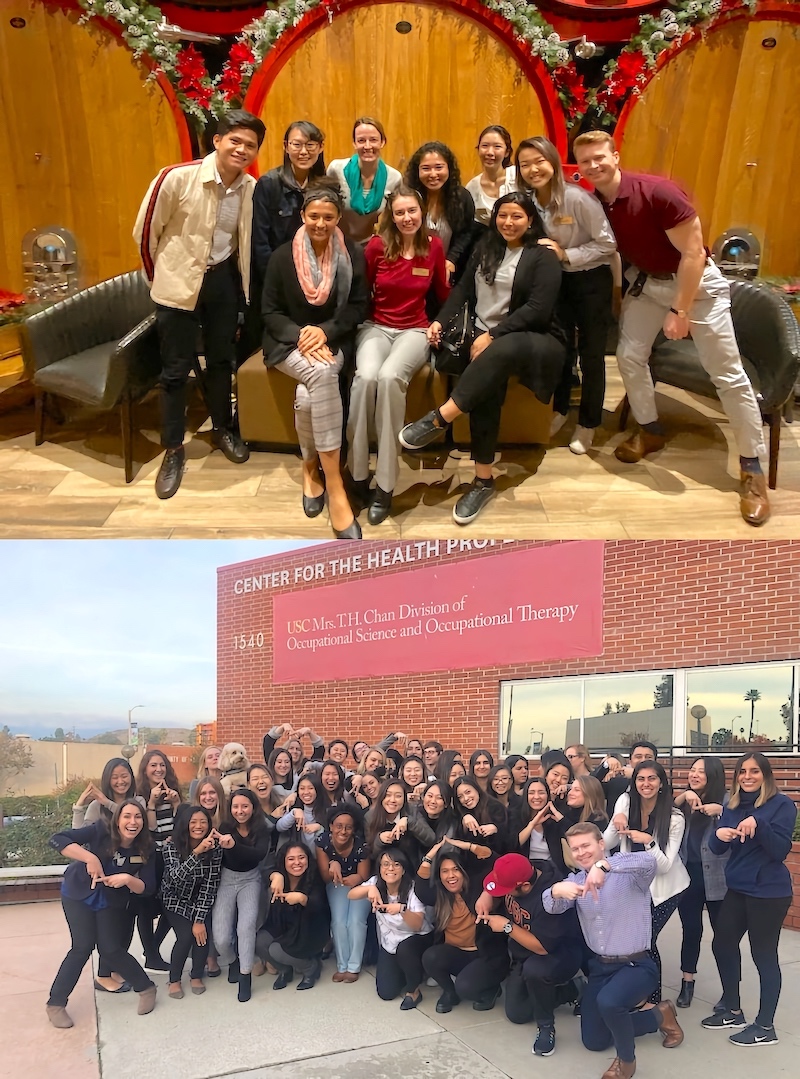
Special shout out to the ambassadors team and the best cohort ♥
⋯
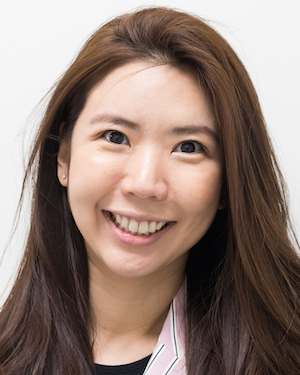
Excited for the Future ⟩
April 27, 2020, by Catherine
Life Hacks
As I wrap up the Spring semester and prepare to depart from my role as the OTD ambassador, I have reflected on impact pursuing the clinical doctorate degree has made in my future as a clinician, and how this particular year of the program has shaped how I view occupational therapy as my career choice. To say the least, this has been a whirlwind year of change, achievements and unforeseen challenges. Transitioning from the master’s program into the OTD, I have transitioned from an OTS to an OTR/L, found new inspiration and meaning in our profession through my residency in support of the Occupational Science Symposium, and have alongside my Trojan family, faced the unforeseen challenges of COVID-19 as a community.
It is no doubt that this novel global pandemic has drastically changed our daily occupational routines. The normalcy of occupations may change when we re-emerge from social distancing, but we are adaptable. As occupational therapists, I am grateful to my mentors, peers and colleagues that have provided the insight to make these changes positive, and training guide them through meaningful occupations. We are armed with clinical reasoning, therapeutic communications, and the OTD has enriched my experiences to see through a holistic lens rooted in evidence-based practice.
In the seminal paper, “An Introduction to Occupational Science, A Foundation for Occupational Therapy in the 21st Century”, Yerxa et al. (1990) wrote:
The concept of occupation and its application in occupational therapy are great ideas whose time has come. For, one of the greatest challenges society faces today is understanding the relationship between engagement in occupation and health. We are filled with excitement about what this idea has to contribute to humankind in the twenty-first century. It has the potential to improve the lives of legions of people, both people with disabilities and other people, if we can nurture its development and maturation. (pp.1-2)
It is as though the early founders of occupational science had a crystal ball. Because as we collectively re-integrate into our society and continue to face safety measures to guard against COVID-19, the challenges we face will no longer solely depend on our infection rates, but how to thrive and live well in the process. Like the founders were 30 years ago, I am excited for the possibilities that lie ahead in our profession. As health professionals we stand in solidarity, focused on our short-term goal of the upmost importance, contributing our part in the efforts to flatten the curve; but we also have the long-term goal. The long-term goal to live our best lives, through the engagement in occupations, towards improvements in the health and well-being of our clients and communities, as we OTs do best.
I continue to be grateful and inspired by our Chan community’s resilience, hope and compassion, and continue to look forward to the contributions future Trojans will pave the way for in the future. It has been an honor and privilege to share my journey through the OTD. Fight on!!
Reference
Yerxa, E. J., Clark, F., Frank, G., Jackson, J., Parham, D., Peirce, D., . . . Zemke, R. (1990). An introduction to occupational science, a foundation for occupational therapy in the 21st century. Occupational Therapy In Health Care, 6(4), 1-17. doi:10.1080/J003v06n04_04
⋯





